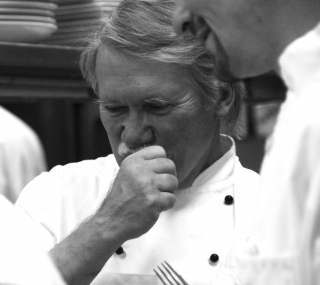
Think Tank: Start Them Off on the Right Foot
23 September 2015As a new term begins, here are eight lessons you must teach each of your students if he and she are to become leaders in our industry.
By Paul Sorgule, MS, AAC
Summer has come and gone, and now a new crop of eager young culinarians is beginning their educational journey. As I follow the growing concerns of chefs across the country who are finding it increasingly difficult to attract qualified and dedicated cooks to make their kitchens hum, I thought it would be appropriate to address students through program directors and faculty.
Part of our job is to truly prepare students for immediate and long-term success. It appears that far too many graduates are entering the workforce with unrealistic expectations (partly due to the growing cost of an education and the need to secure well-paying positions to cover their debt service). So, here are my lessons for those who are just starting their educations, as well as those who are planning to walk that stage and receive a degree:
Your Degree Is Not a Free Pass
The degree is a foundation that must be built on through significant practical application. The degree is not a shortcut. To reach the pinnacle of their careers, graduates will need to spend time as a prep cook, line cook, roundsman and sous chef. How fast a graduate moves from prep to sous chef depends on the individual, his or her commitment, the passion he or she exhibits, teamwork and the quality of his or her cooking. PATIENCE is one of the first lessons that students must learn.
It Is Called Work for a Reason
I know you present this, but you cannot emphasize it enough. Working in kitchens is very difficult—physically, mentally and emotionally. It never gets easier, and graduates should not expect it to. They need to be prepared for this reality. WORK is gratifying, but always CHALLENGING. This is the second lesson that students must learn.
The Goal Is Breakthrough Service
Of course, we are teaching students how to cook great food and how to organize and navigate in the kitchen environment, but the real job of everyone in the restaurant is guest service. We are in the SERVICE industry is the third lesson that students must learn.
Professionalism Is an Expectation
Forget those we witness in restaurants who are not professional—this should never be an expectation of culinary graduates. The restaurants that are most successful are the ones where professionalism is a core competence. The fourth lesson is that students and graduates should look, act, interact, speak and perform as a professional would. They need to treat all people and the food that they are fortunate enough to handle with the highest level of professionalism. PROFESSIONALISM begins today, and those who want to be a career chef must never waiver from that standard.
Value Is Everyone’s Expectation
Students should expect exceptional value from the school where they are enrolled, faculty members should expect value performance from the students in their classes, and once a student graduates, employers and guests in any restaurant would expect great value from the kitchen staff. This VALUE is lesson No. 5 and includes product, service, responsiveness, consistency and the overall experience of working with a graduate and receiving the fruits of his or her labor as a paying guest.
Respect Is the Roadmap to Success
We have an obligation to create an environment of respect in our classroom kitchens. The attitude toward others demonstrated in college will likely be the attitude that these graduates have toward those they will work with, work for and serve in the future. The sixth lesson is that professionals RESPECT other employees for who they are, RESPECT the chain of command in a kitchen, RESPECT the ingredients that they work with and those who brought them to the receiving door, and RESPECT the guest who is spending money so that the restaurant can thrive.
Lead by Example
It is never too early to demonstrate to students that “Do what I say, not what I do” doesn’t work. Just like with parenting, students will emulate what the instructor does, cooks will emulate what the chef does, and chefs will emulate what the owner/operator does. The seventh lesson is to know that to LEAD requires FOLLOWERS. All great leaders began their journey as followers who saw their leader as someone worthy of respect.
Education Never Ends
Finally, students should realize from day one that their education is not an end game. Their time in school is just the beginning. Every day on the job will provide another opportunity to learn and grow as a competent professional. The final lesson is this: Any day that passes us by without taking the opportunity to LEARN is a true missed opportunity.
Have a great school year preparing students to become future leaders of our industry. Their success, to a large degree, is in your hands.
Paul Sorgule, MS, AAC, president of Harvest America Ventures, a “mobile restaurant incubator” based in Saranac Lake, N.Y., is the former vice president of New England Culinary Institute and a former dean at Paul Smith’s College. Contact him at This email address is being protected from spambots. You need JavaScript enabled to view it., www.harvestamericaventures.com.
